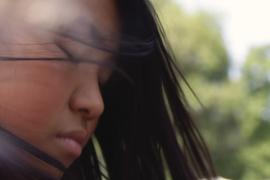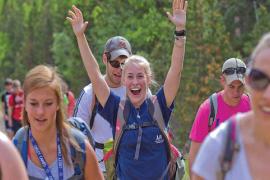An Interview with Florence Williams
Growing up a city girl in a family that valued extended outdoor time, Florence Williams is today a science writer and environmental journalist, bestselling author, public speaker, and podcaster. With an English degree and a graduate degree in creative writing, Williams is a contributing editor at Outside Magazine and a freelance writer for the New York Times, New York Times Magazine, and National Geographic, among other publications. Her most recent book, The Nature Fix: Why Nature Makes Us Happier, Healthier, and More Creative, is an investigation into the restorative powers of nature and a look at the science that backs it up.
What made you choose environmental journalism as a career?
I’ve always been interested in the intersection between people and the environment, both how the environment can hurt us, through pollution and things like that, and also in terms of how nature can help us.
You said the aspiration of your book, The Nature Fix, was to find the best science behind our nature-primed neurons and share it. Why was that so important to you?
It was important to me for personal reasons. I had experienced a dramatic shift in my own habitat. I’m a curious person and I like writing about research, but also I feel like we live in an evidence-based society. If we’re going to change the way we live our lives, the best way to enable large-scale change is through knowledge and evidence. People want to see proof. You can’t just say “Everyone should go for a walk.” Hospitals, schools, businesses, and other organizations want to see the data. And there really is some emerging data, but people generally just aren’t aware of it.
In your own life, you’ve said when you moved from Colorado, where you had easy access to the mountains, to Washington, DC, you noticed some dramatic things about your mood, creativity, and productivity. Can you elaborate on some of the changes you noticed?
I grew up in New York City, and I like cities, but I had lived in the Rockies for 23 years, so I was pretty spoiled. DC is a lot noisier than the New York I grew up in. My home is near a major airport, so we hear the airplanes all the time. I didn’t even realize that I was sensitive to noise, but it turns out that I am. I definitely felt more anxious. I was having trouble sleeping. I was depressed. I had some brain fog going on. I just basically was having a classic stress response.
Some of that is because it was all new and I wasn’t used to it yet. But the reality is that people who live in cities are more anxious. Mental health issues are worse in cities. Definitely for someone like me who is a nature-connected person, it was important to figure out how to connect to nature in the city. When I first got to DC, I thought if it’s not a pristine mountaintop, what’s the point? But I learned that it is easy to cultivate awe in the city and that it’s worth doing.
In your book, The Nature Fix, you talk about two dominant theories that attempt to explain why our brains need nature. Can you give us an “in a nutshell” explanation of those two theories?
Attention Restoration Theory states that when we’re outside we’re drawn into this state of soft fascination in which our attentional networks get a little bit of a break. We start experiencing the world through our senses. Our nervous system quiets down a little bit and we are able to recharge. When we’re in this more comfortable state, our mood increases and we just feel better.
The other theory, Stress-Reduction Theory, posits that the nervous system response drives the happiness, in that nature exposure can immediately lower our anxiety and stress levels, and then we can think more clearly and cheer up.
There are some other theories too — that it’s just awe of experiencing beauty, or other researchers say it’s actually the colors blue and green that make the difference.
I concluded that maybe it’s not the pathway that matters, but that our brains evolved in nature and there is some very fundamental comfort that kicks in. We were made to take in oxygen from the trees. On some level our bodies and brains just relax when we’re outside. As long as we know that being outside facilitates other health effects — fresh air, exercise, being connected with our friends, being disconnected from technology — there are all these amazing things that come together when we’re outside. We’ve seen from large genealogical studies as well as small ones that there does seem to be this health effect that comes when we’re closer to green space. People who live closer to green space have lower rates for certain health risks, and that’s after adjusting for income.
You point out that nature is one of the few places where human beings can engage all five senses. Can you give a couple of examples that illustrate some of the positive effects of nature based on smells, hearing, sight, etc.?
I learned that there’s a direct pathway from our nose to our brains. There’s a lot of research suggesting that certain scents given off by certain forest trees can increase our immune cells, which is pretty impressive. These elevations in immune cells seem to last seven to 21 days, so we need to go out in the woods at least once every three weeks.
When we look at landscapes that have a natural fractal pattern [fractals are infinitely complex patterns that are self-similar across different scales] — natural shapes like tree limbs, clouds, ripples on the water, or coastlines — our brains produce more alpha waves, which signify a wakefully relaxed state. Fractals also engage the parahippocampus in our brains, which is involved with regulating emotions.
It’s nice to know that some positive effects of nature are immediate. What happens when you spend just five minutes in nature?
You get a little bit of an attention break — a cognitive break — so your attention’s a little bit better after five minutes. You get a little improvement in mood. It looks like, depending on what you’re looking at, it can actually make you behave in a more generous way with people around you. This came out of a study having students look at a tall tree on campus for one minute. They were more helpful, picked up more pencils, etc., after that. There’s just something about nature that makes us feel more connected to something bigger than ourselves and more community oriented.
What about spending longer amounts of time in nature?
It really looks like we need nature at all levels. We need it in our daily lives, with trees on our streets and green in our schoolyards. We also need access to city parks, places close by where we can go to elevate our mood and vitality.
In Finland, a study found that for our emotional health we should have a minimum dose of at least five hours a month in natural settings.
And spending prolonged periods of time in nature helps us answer some of the big questions: who we are in the world, what we want to do with our lives, and what our dreams are — those are really fundamental and important. If we’re experiencing longer stress or grief or trauma, extended periods of time outside can also be very healing.
One thing that’s great about the summer camp experience is kids get out outside for days and days at a time. For kids, improving patterns of self-esteem and confidence seem to be benefits associated with prolonged time in nature. There’s also research to suggest that girls, especially, benefit from time in nature. They actually tend to approach parity with the boys in a nature setting, and girls really benefit in terms of body perception with time spent outside as well.
I should ask you if you have personal experience with summer camp. Did you ever attend one? How about your children?
I went to sailing camp and tennis camp, but I had a lot of outdoor time with my dad in the summers. We would go out in the wilderness for weeks at a time. My parents were divorced and that was my dad’s custody arrangement, that he get extra time with me in the summer.
Both of my kids go to summer camp for five weeks in the summertime. In fact, they’re going to the same summer camp that my dad went to, Camp Mondamin and Camp Green Cove in North Carolina.
I love Michael Chabon’s quote you used: “Childhood is or has been or ought to be the great original adventure, a tale of privation, courage, constant vigilance, danger, and sometimes Calamity.” That sort of epitomizes camp when it’s done right. Any words of advice for camp professionals when it comes to getting kids out in nature?
Some of the evidence we have really suggests that kids can benefit from, not only time outside, but unstructured time in nature — when they can just experience time running around on their own, where they can gaze up at the stars for a long time and be wowed by the beauty of the universe, or discover a really cool log, or the sound that their paddle makes in a canoe.
Photo courtesy of Camp Gallagher, Lakebay, Washington


